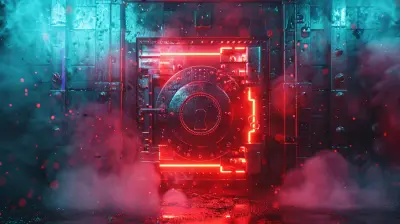29 March 2025
Debt is a tough beast to tame. You start with a few credit cards, maybe a personal loan, and before you know it, you're juggling multiple due dates, high interest rates, and a seemingly never-ending cycle of payments. If you're feeling the pressure, debt consolidation might be a solid solution—but is it right for you?
Let’s dive into the telltale signs that you might be a good candidate for debt consolidation. 
What is Debt Consolidation?
Before we jump into the signs, let's quickly cover what debt consolidation actually is.Debt consolidation involves rolling multiple debts into a single loan or credit account. The goal? To simplify payments, lower interest rates, and make your financial life a little less stressful. Instead of keeping track of several bills each month, you make just one payment—often at a lower rate.
Sounds good, right? But the real question is, does it make sense for your financial situation? 
Signs You’re a Good Candidate for Debt Consolidation
Not everyone benefits from debt consolidation. Here are some key indicators that this financial move could be the right fit for you:1. You’re Struggling to Keep Up with Multiple Payments
If your debts are spread out over several credit cards, personal loans, or store accounts—and keeping up with different due dates feels overwhelming—consolidation can simplify your life. Rolling everything into one monthly payment means fewer chances of missing due dates, getting hit with late fees, and damaging your credit score.Think of it like cleaning up a messy room. Instead of all your stuff scattered everywhere, you neatly organize everything into one space.
2. Your Interest Rates Are Sky-High
Credit card debt is notorious for high interest rates—sometimes 20% or more. When a chunk of your payment barely dents the principal balance because of all the interest, you're stuck in a financial hamster wheel.If you can secure a consolidation loan with a lower interest rate, you’ll save money in the long run and actually make progress on your debt instead of just treading water.
3. Your Credit Score is Decent (or Improving)
Your credit score plays a huge role in your ability to qualify for a good debt consolidation loan. If you have fair to good credit (typically 650+), you’ll likely get better terms.If your credit score is on the lower side, you might not qualify for a low-interest consolidation loan—meaning it won't do much to improve your situation. In that case, improving your credit score first might be the better move.
4. You Have a Steady Income
Debt consolidation isn’t a magic wand that makes your debt disappear. You still have to make payments—just in a more manageable way.A steady, reliable income ensures that you can keep up with your new consolidated payment. If you’re struggling to cover even the essentials, a different debt relief approach (like debt settlement or credit counseling) might be worth considering.
5. You Want to Pay Off Debt Faster
Debt consolidation doesn’t just simplify payments—it can speed up your repayment timeline, too.For example, if you’ve been making minimum payments on multiple credit cards, those debts could stretch on for years due to compounding interest. Consolidating into a loan with a fixed term (like 3-5 years) gives you a clear finish line and forces you to stay on track.
6. You Have a Plan to Avoid Future Debt
Debt consolidation only works if you change your financial habits. If you consolidate your debt but continue using your credit cards irresponsibly, you'll end up in a worse position than before.A good candidate for debt consolidation is someone who is ready to make a real change in their spending and budgeting habits. That means:
✅ Cutting down unnecessary expenses
✅ Avoiding new debt unless absolutely necessary
✅ Creating (and sticking to) a realistic budget
Think of debt consolidation like pressing the reset button. It helps clean up your financial mess, but it’s up to you to keep it that way.
7. You’re Committed to Staying Out of Debt
Let’s be real—debt consolidation isn’t a shortcut to financial freedom. It helps, but it takes discipline to make it work.If you're committed to:
- Paying on time, every time
- Cutting back on unnecessary spending
- Avoiding taking on more high-interest debt
Then consolidation could be a fantastic tool to get you back on track. Otherwise, it may just be a temporary fix. 
When Debt Consolidation Might NOT Be a Good Idea
While debt consolidation works for many, it's not the best option for everyone. If any of these apply to you, you may want to rethink your approach:❌ Your credit score is too low – You might not qualify for a loan with a low enough interest rate to make consolidation worthwhile.
❌ You’re drowning in debt with no stable income – If you can’t make monthly payments, you might need debt settlement or bankruptcy instead.
❌ You haven’t addressed your spending habits – If you don’t change how you manage money, consolidation could make things worse.
❌ You’re already close to becoming debt-free – If you can clear your debts in six months to a year without consolidation, it might not be worth the effort. 
How to Get Started with Debt Consolidation
So, you’ve decided that debt consolidation might be right for you—what’s next?1. Check Your Credit Score
Your credit score influences your loan options. The higher it is, the better your interest rates will be.2. Review Your Debts
Make a list of all your outstanding debts, including balances, interest rates, and minimum monthly payments. This helps you determine how much you need to consolidate.3. Compare Consolidation Options
There are several ways to consolidate debt:- Debt consolidation loans – Personal loans used to pay off higher-interest debt
- Balance transfer credit cards – 0% APR promotional rates (if you qualify)
- Home equity loans or HELOCs – Using your home’s value to consolidate debt (risky but an option)
4. Choose the Best Option
Go for the option that gives you the lowest possible interest rate while ensuring payments are manageable.5. Stick to Your Repayment Plan
Once you consolidate, make sure you don’t accumulate new debt—otherwise, you're back to square one.Final Thoughts
Debt consolidation can be a game changer for the right person. If you're drowning in multiple high-interest payments but still have steady income and decent credit, it might be just what you need to regain control of your finances.That said, it’s not a quick fix. Without the right habits in place, you could fall right back into debt. But if you're committed to making it work, debt consolidation could be the fresh start you're looking for.
So, do you think you’re a good candidate for debt consolidation? If so, it might be time to take that next step towards a debt-free future.




Kian Bass
Embrace the journey to financial freedom! Recognizing the need for debt consolidation is the first step toward a brighter future.
April 1, 2025 at 4:57 AM